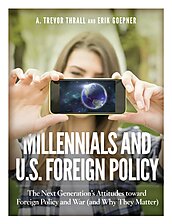The Millennial Generation, those roughly 87 million adult men and women born between 1980 and 1997, now represent one quarter of the U.S. population, out numbering the Greatest Generation (1913–1924), the Silent Generation (1925–1945), the Baby Boomers (1946–1964), and Generation X (Gen Xers) (1965–1979). In addition to being far more likely to have posted a “selfie“on social media than other generations, the Millennials also have distinct attitudes toward a range of important foreign policy issues. With those on the leading edge of Millennials now hitting their mid-thirties, this cohort is becoming increasingly influential.
Just as the generations before them, the Millennials’ worldviews owe a great deal to early life experiences and the foreign policy issues that dominated their childhoods. The main drivers of Millennials’ foreign policy attitudes fall into two major categories. The first category comprises the trends and events that started or occurred before the Millennials came of age and provide their historical context. This includes the end of the Cold War and the evolution of the global distribution of power,the development of the Internet, and the acceleration of globalization. The second category includes major events that have occurred so far during the Millennials’ “critical period,” the period between the ages of roughly 14 to 24 when people are most susceptible to socialization effects. Most obviously these include the attacks of 9/11 and the wars in Afghanistan and Iraq.
Together, these forces have led to three critical differences between Millennials’ foreign policy views and those of their elders. First, Millennials perceive the world as significantly less threatening than their elders do, and they view foreign policies to deal with potential threats with much less urgency. Second, Millennials are more supportive of international cooperation than prior generations. Millennials, for example, are far more likely to see China as a partner than a rival and to believe that cooperation, rather than confrontation, with China is the appropriate strategy for the United States. Finally, thanks in particular to the impact of the wars in Iraq and Afghanistan, Millennials are also far less supportive of the use of military force and may have internalized a permanent case of“Iraq Aversion.”
The rise of the Millennial Generation portends significant changes in public expectations and increased support for a more restrained grand strategy. There is no reason, however, to expect that U.S. grand strategy will become particularly coherent under Millennial leadership. Millennials, like every generation, reflect significant partisan splits over core issues. In the absence of a unifying security threat, these partisan divides ensure that U.S.foreign policy will feature as much debate and dissensus in the future as it does today.

This work is licensed under a Creative Commons Attribution-NonCommercial-ShareAlike 4.0 International License.


